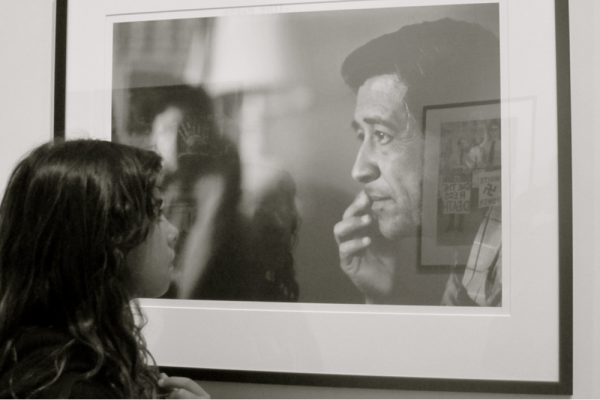In a White House proclamation, President Joe Biden declared March 31, 2021 as César Chávez Day. Biden called upon “all Americans to observe this day as a day of service and learning, with appropriate service, community, and education programs to honor César Chávez’s enduring legacy.”
Chávez, who was born March 31, 1927 and died in 1993, was a Mexican American activist who organized for farmworkers’ rights. Along with Dolores Huerta, he co-founded the National Farm Workers Association, which later became the United Farm Workers labor union. Chávez’s worldview espoused Catholic social teaching: Chávez ended his 25-day hunger strike in 1968 by receiving the Eucharist, sitting next to Sen. Robert F. Kennedy.
Now, Biden prominently features a bust of Chávez in the Oval Office.
“To Chávez, ‘La Causa’ meant elevating our common humanity to the center of an agenda for progress. And that elevation meant organizing for safe and healthy workplaces, a living wage, protections against sickness and disability, time with family, and so much else that we continue to prize and fight for today,” Biden wrote in the proclamation. “I was proud to place a bust of César Chávez in the Oval Office, so that no one who enters that historic room may forget the powerful truths his farm worker hands imparted.”
To celebrate the occasion, First Lady Jill Biden traveled to the historic “Forty Acres” property outside Delano, Calif., where the union began. The Delano property is now a COVID-19 vaccine site for thousands of farm workers through a partnership between the Cesar Chávez Foundation (which owns and manages the Forty Acres), UFW and the UFW Foundation, Kern County Latino COVID-19 Task Force, Kern County, and Kern Medical Center.
According to Paul F. Chávez, president of the César Chávez Foundation and César’s son, “Forty Acres is sacred ground.”
“It was the first permanent home for our movement and where my father fasted for 25 days in 1968, calling on all of us to dedicate ourselves to serving others,” Chávez said in a news release. “So what better way to keep my dad’s legacy alive today than by vaccinating farm workers here at the Forty Acres? What more fitting way for Dr. Biden to honor him than by taking part in helping protect farm workers who have suffered so disproportionately from COVID-19?”
Teresa Romero, president of UFW, agreed.
“It’s also heartening when people in positions of power take the time to meet with and understand farm workers and the barriers they face,” Romero said. “Most urgent for them now is immigration justice and the path forward with the Farm Workforce Modernization Act.”
But Chávez’s own legacy on immigration is complicated; while he marched, organized, and lobbied for dignity for farmworkers, he also used racist, anti-immigrant rhetoric. Chávez referred to illegal immigrants as “ wetbacks,” and, in 1974, he urged Dolores Huerta to “go after them.”
After Biden's announcment, Gustavo Arellano, a Los Angeles Times columnist who has written about Chávez, tweeted, “Cesar Chavez is a hero, but let’s take stock of his sins as well.”
In his 2019 article “César Chávez and Egalitarian Ethics: Lessons from a Contradictory Legacy,” Jeremy Cruz detailed Chávez’s legacy, which “provides us with egalitarian ideas and examples of effective egalitarian action; he also provides us with an important lesson in the dangers of unaccountable leadership.”
“For years, Chávez’s leadership was honored and fortified on the basis of actions and achievements that were well behind him and that did not correspond to his present actions and the effects that they were having on colleagues, union members, and not-yet-unionized farm workers,” Cruz wrote.
Miriam Pawel, who reported in 2006 that the UFW was far removed from the union Chávez and others had established, also wrote a 2014 biography, The Crusades of Cesar Chavez. In it, she asked a former Arizona UFW leader who had parted ways with Chávez long ago if he still thought of Chávez as a great man.
“Palms up, he held his right hand above his head and lowered his left near the floor,” Pawel wrote. “On balance, he said, the good outweighed the bad. It was not even close.”
Got something to say about what you're reading? We value your feedback!





